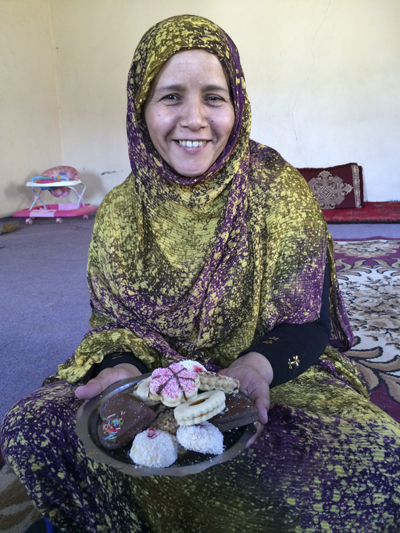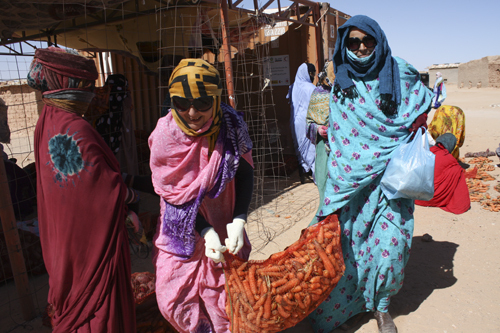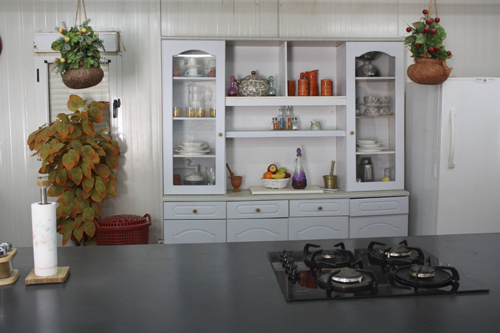The Sahrawi refugees have lived in desert camps in Tindouf, south-western Algeria, since fleeing their homes in the contested territory of Western Sahara nearly 40 years ago. They rely almost wholly on outside assistance, including food rations. The staple food they receive -- mostly dried items including cereals and pulses, supplemented by some fresh vegetables -- has barely changed over the years. But one refugee in the camp has been doing her bit to try to introduce more variety into their diet.
***
Haha Ahmed Kaid Salah, a 46-year-old mother of six, is a foodie. She devours TV cooking shows, including Masterchef, and scours the internet for recipe ideas. Her favorite TV chefs include Britain's Jamie Oliver and Gordon Ramsay, and Egyptian-born Chef Osama, a celebrity on Dubai television.
She dreams of baking exotic breads, croissants, donuts and cupcakes. But from her Saharan desert home in Boujdour refugee camp, in Tindouf, south-western Algeria, she knows that there are limitations to what she can achieve.
Like all refugees living in the five camps in Tindouf, Haha has to rely on food distributions funded by the European Commission's Humanitarian Aid and Civil Protection department, ECHO, and other donors organized by the UN World Food Program and Oxfam.
In recent months, it has been tougher than normal. Refugees used to receive nine dry food items from the World Food program and the Sahrawi Red Crescent. But since the beginning of the year, due to funding constraints, they only receive seven. The most expensive items, barley and split beans, were cut from the food basket.
Fresh food is provided by another ECHO partner, Oxfam. Thanks to the opening of a refrigerated food supply centre in Rabouni -- a joint venture between Oxfam and the Sahrawi Red Crescent and financed by ECHO -- fresh vegetables that arrive almost two thousand kilometers away by road in northern Algeria, can be stored under optimal conditions, allowing two distributions to take place each month despite searing temperatures than can reach 50 degrees celsius.
The vegetables help to improve the diet of refugees, many of whom suffer from lack of iron and other nutritional deficiencies.
Even so, it can be a challenge for the refugees to come up with a variety of meals when they are so dependent on limited rations. But, it's a challenge Haha takes on with some relish.
She was just six years old when her family left their home in the disputed territory of Western Sahara amid worsening fighting and made their way to Tindouf. The Sahrawian refugees have lived here for almost four decades, waiting for a political solution and a referendum on self-determination before they can consider going back home.
It's a harsh life. The soaring temperatures make it a challenge to store food and electricity is still not available in all the camps (although it is available in Boujdour, where Haha lives). Previous nutritional studies have shown high rates of anaemia in women and children, though, largely thanks to school feeding programs, the rate for children has dropped.
Haha is always looking for new ways to make the best of the food the refugees do receive each month. "I look at recipes on the internet", she said. "Many will contain ingredients that we can't get here, so I take them out and try to find some substitutes. There are always problems because we only get a limited selection of vegetables.
"Back home, we used to have all types of vegetables, many kinds of fruits, fish and good quality meat."
Three years ago, Haha won a cooking competition. Her prize was to present a TV cooking show on Sahrawi national television. Since then, she has become a bit of a celebrity, the show airing twice a week.
"I love doing the show. I want to share my ideas and skills to help others cook tasty meals." In fact, her show translates from Arabic as From Little, We Can Do Tasty Things.
Haha also tries to add some health messages in her show.
I talk about good health and why vegetables are so important. But, here, we have a culture where for women, to be fat is considered a thing of beauty. It's hard to change that habit. Nevertheless, I will continue to talk about healthy eating and then it's up to them!"
Click here for more on ECHO projects in south-western Algeria.



